Collison Surname Ancestry ResultsOur indexes 1000-1999 include entries for the spelling 'collison'. In the period you have requested, we have the following 293 records (displaying 1 to 10): Single Surname Subscription | | | Buying all 293 results of this search individually would cost £1,672.00. But you can have free access to all 293 records for a year, to view, to save and print, for £100. Save £1,572.00. More... |
These sample scans are from the original record. You will get scans of the full pages or articles where the surname you searched for has been found. Your web browser may prevent the sample windows from opening; in this case please change your browser settings to allow pop-up windows from this site. Clergy at Beverley Minster
(1322-1347)
The minster (collegiate church) of St John of Beverley in Yorkshire was an important foundation with extensive ecclesiastical and temporal rights exercised by the chapter. The main register of the administration in both respects was the chapter act book, and this edition of the act book from 2 February 1322 to 19 November 1347 was edited by Arthur Francis Leach for the Surtees Society and published in 1903. The act book material occupies pages 1 to 136; to this were added extracts relating to Beverley from the registers of the Archbishops of York from 1279 to 1381; miscellaneous documents from York Minster manuscripts and the British Museum from 1135 to 1314; and a copy of the Beverley Provost's Book, compiled in 1417, but with material from the preceding centuries. All these sources are covered by this index: but the bulk of the personal references are from the chapter act book, and relate to clergy at or connected with Beverley.COLLISON. Cost: £4.00.  | Sample scan, click to enlarge
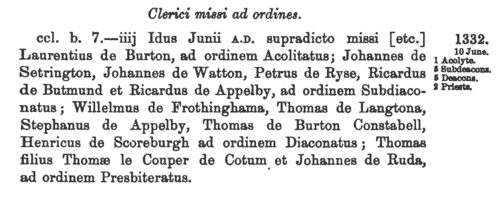
| Inhabitants of Aberdeen
(1398-1570)
Extracts from the first 27 surviving volumes of Aberdeen burgh (borough) records were made by John Stuart for the Spalding Club and published in 1844. Although it is believed that the town records were preserved on parchment rolls until about 1380, and in book form thereafter, by 1591 the town clerk remarked that there existed of the earliest records only 'peces and partis of four ald imperfyt and informall buikis conumitt and eitten be mothes, for aldnes and antiquite euill to be red, yit to be keipit for a monument be resoun of the antiquite'. The regular series of books surviving comprised 61 folio volumes from 1398 to 1745, and these contained the proceedings of the Council of the Burgh, of the Baillie Court, and the Guild Court.COLLISON. Cost: £4.00.  | Sample scan, click to enlarge
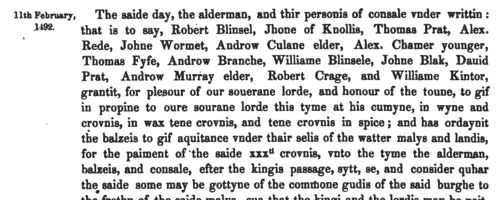
| Scottish litigants, rebels and cautioners
(1585-1592)
The Privy Council of Scotland exercised a superior judicial authority in the kingdom, and consequently received and dealt with a constant stream of petitions, as well as dealing with the internal security of the state. This register of the council from 1 August 1585 to 31 July 1592, in the reign of king James VI, was edited by David Masson, and published under the direction of the Lord Clerk Register of Scotland in 1881. Some of the individuals mentioned are the complainants, those of whom they complained, and the sureties on both sides: at this period, some of the complainants are alleging serious attacks, often of a feuding nature. Many of the bonds entered into by the cautioners are promises to keep the peace towards such enemies. Failure to answer to the council when summoned was a serious contempt, leading to being denounced a rebel, with serious consequences. But 'horning' was also used in the pursuit of debts: there was no imprisonment for debt in Scotland, but a creditor could have an obstinate debtor ordered, in the sovereign's name, to pay what was due, failing which, the debtor could be put to the horn, denounced as a rebel, and imprisoned as a rebel. The main text (to page 774) is from the Acta Secreti Concilii, containing the minutes of the Privy Council, with intermixed Acta Proper (political edicts), Decreta (judicial decisions), Acta Cautionis (acts of caution) and Bands (registration of bonds). After that are printed some miscellaneous Privy Council documents from the same years: additional acts of caution (775-778); ordinances and acts anent the Borders and the North (779-814); and miscellaneous privy council papers (815-834). The sources most productive of names, the Acta Cautionis and Registration of Bands, are also the most repetitive in form, and are not transcribed verbatim and literatim: nevertheless, one of the editor's rules was for 'All proper names and names of places occurring in the originals to be preserved in the abstracts without exception, and in the exact original spelling.'
COLLISON. Cost: £4.00.  | Sample scan, click to enlarge

| Scottish litigants, rebels and cautioners
(1592-1599)
The Privy Council of Scotland exercised a superior judicial authority in the kingdom, and consequently received and dealt with a constant stream of petitions, as well as dealing with the internal security of the state. This register of the council from August 1592 to May 1599, in the reign of king James VI, was edited by David Masson and published under the direction of the Deputy Clerk Register of Scotland in 1882. The publication brings together the contents of the principal register (Acta Secreti Concilii) with acts and bands (bonds) of caution (surety) from the registers called Acta Cautionis (pp 561-730); Acts and Ordinances relating to the Borders and the North (731-748); and Miscellaneous Privy Council Papers (749-769). Many of the individuals mentioned are the complainants, those of whom they complained, and the sureties on both sides: at this period, many of the complainants are alleging serious attacks, often of a feuding nature. Many of the bonds entered into by the cautioners are promises to keep the peace towards such enemies. Failure to answer to the council when summoned was a serious contempt, leading to being denounced a rebel, with serious consequences.
COLLISON. Cost: £4.00.  | Sample scan, click to enlarge

| Merchants and traders in Aberdeen
(1399-1631)
A. M. Munro searched the council registers of the royal burgh of Aberdeen, and compiled this list of burgesses admited to the borough. The entries prior to 1591 were contained in lists engrossed in the council registers at the close of the minutes for the year ending at Michaelmas, but after that date in addition to the annual lists, which are continued, there is almost always a separate minute of admission under the respective dates. The records before 1591 are not only sparser, often with no more than a name, but are also lacking for 1401-1405, 1413-1432, 1434-1435, 1518-1519, 1557 and 1562-1564 - other blanks were filled in from the guildry accounts where such existed. Guild burgesses were allowed unfettered trading rights in Aberdeen; simple burgesses could only deal in Scottish wares (so being barred from the lucrative English and Flemish imports and exports); trade burgesses were limited to their own particular trades; and the council was able ex gratia to create honourary burgesses, who were accorded the full privileges of burgesses of guild and trade, and among whom numbered members of almost every family of note in Aberdeenshire. Burgesses could thus be created by descent, by apprenticeship into a trade, or ex gratia, and in the later portions of this roll the precise circumstances are usually given, sometimes also with the name of a cautioner or surety. Burgesses, masters and cautioners are all indexed here.COLLISON. Cost: £4.00.  | Sample scan, click to enlarge

| PCC Probates and Administrations
(1633)
The Prerogative Court of Canterbury's main jurisdiction was central and southern England and Wales, as well as over sailors &c dying abroad: these brief abstracts, compiled under the title "Year Books of Probates", and printed in 1902, usually give address, date of probate and name of executor or administrator. They are based on the Probate Act Books, cross-checked with the original wills, from which additional details are, occasionally, added. The original spelling of surnames was retained, but christian and place names have been modernised where necessary.COLLISON. Cost: £2.00.  | Sample scan, click to enlarge
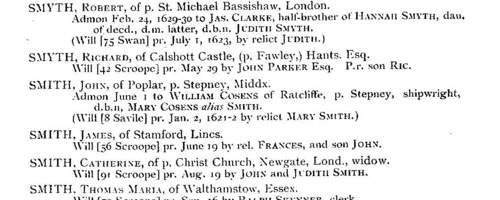
| Southwell Peculiar Baptisms, Marriages and Burials
(1614-1641)
Each year a copy of the previous year's register of baptisms, marriages and burials, attested by the incumbent and churchwardens, was returned to the diocesan authorities. The peculiar of Southwell in Nottinghamshire was ordinarily exempt from episcopal jurisdiction in such matters, and the 24 parishes in the peculiar made similar returns to the Southwell registry. A few of these survive from this period, and they were transcribed by T. N. Blagg and printed as the first volume of the Record Series of the Thoroton Society in 1903. The returns are for Beckingham 1634, 1637, 1641; Bleasby 1633; Blidworth 1638; Calverton 1617, 1623; *Caunton 1614, 1619, 1628, 1641; Cropwell Bishop 1638, 164; Darlton 1622, 1633, 1641; *Dunham 1641; Edingley 1638; Farnsfield 1623; Halam 1622, 1637; Halloughton 1622, 1637; *Holme 1623, 1625, 1627, 1638, 1641; Kirklington 1622, 1638; *Morton 1622, 1623; *North Muskham 1623, 1633, 1638; South Muskham 1623; *Norwell 1638, 1641; Oxton 1622; *Ragnall 1623; Southwell 1633, 1640; Tithby (cum Cropwell Butler) 1625; Upton 1633, 1638; and Woodborough 1623, 1627, 1637, 1638 and 1640. Parishes marked with an asterisk (*) are those for which the original registers were missing for the period covered by the transcripts.COLLISON. Cost: £4.00.  | Sample scan, click to enlarge
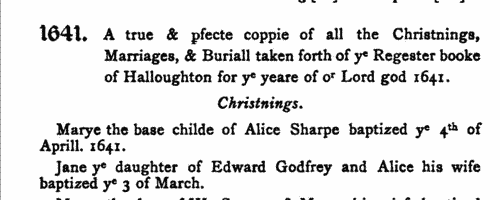
| Official Papers
(1645-1647)
The State Papers Domestic are the main series of records of internal British administration for this period. The volumes printed in abstract here (Charles I dx to dxv) run from July 1645 to December 1647, a period of defeat of royal power by the parliamentary forces. Parliament's victory at Naseby in June 1645 led to the collapse of the Royalist cause and the imprisonment of the king in Carisbrooke Castle towards the close of 1647. During all these events the administration of government continued, largely using the same institutions, leaving similar series of records as before: but executive power is now represented in these books by the Committee of Both Kingdoms (England and Scotland). The State Papers Domestic for these years are largely concerned with the prosecution of hostilities, the movements and supply of troops, and the treatment of 'delinquents'. Chronologically interleaved with the abstracts of the main volumes are details from the series of Proceedings of the Committee of Both Kingdoms, but these are lost for the years 1646 to 1647, brief notes only surviving in the Indexes to the Day Book of Orders. There are also appendices relating to the victualling and disposition of the Navy, taken from the Letters and Papers of the Committee for the Admiralty and the Committe of the Navy, which also include some petitions from sailors, victuallers, officials, or their dependants, seeking redress or relief.COLLISON. Cost: £4.00.  | Sample scan, click to enlarge
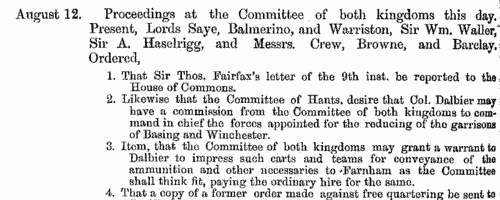
| Prerogative Court of Canterbury Wills: Norfolk: Strays
(1658)
William Brigg compiled abstracts of all the wills in Register "Wootton" of the Prerogative Court of Canterbury. The abstracts of those proved in 1658 were published by him in 1894. The court's main jurisdiction was central and southern England and Wales, as well as over sailors &c dying abroad. We have re-indexed the whole volume, county by county, for both testators and strays (legatees, witnesses and other persons mentioned in the abstracts). COLLISON. Cost: £4.00.  | Sample scan, click to enlarge
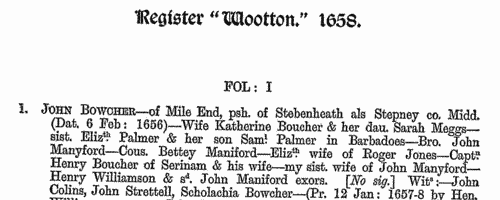
| London Marriage Allegations
(1611-1660)
London, Essex and part of Hertfordshire lay within the diocese of London. In the later 17th century the individual archdeaconry courts issued marriage licences, but for this period the only surviving material is from the overarching London Consistory court. The main series of marriage allegations from the consistory court was extracted by Colonel Joseph Lemuel Chester, and the text was edited by George J. Armytage and published by the Harleian Society in 1887. A typical later entry will give date; name, address and occupation of groom; name, address and condition of his intended bride, and/or, where she is a spinster, her father's name, address and occupation. Lastly we have the name of the church where the wedding was going to take place. For the later years Colonel Chester merely picked out items that he thought were of interest, and his selections continue as late as 1828, but the bulk of the licences abstracted here are from the 17th century.COLLISON. Cost: £4.00.  | Sample scan, click to enlarge

|
Research your ancestry, family history, genealogy and one-name study by direct access to original records and archives indexed by surname.
|












